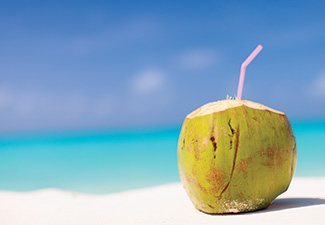[box]Coconut water is arguably the healthiest beverage on the planet, filled with protein, fiber and electrolytes. Considering its amazing ability to hydrate post workout, you can think of it as “nature’s Gatorade”. Here is the complete guide to coconut water, its benefits and the best and worst options on the shelf.[/box]
Health Benefits of Coconut Water
Containing a unique combination of micronutrients and B vitamins, coconut water is exceptionally beneficial for our health. Some of the most profound benefits of drinking coconut water regularly include:
- Helping to prevent heart disease
- Lower blood pressure
- Increased antioxidant activity
- Helping to prevent neurodegenerative disorders
- Promotes anti-aging
Yes coconut water has powerful health benefits, but before you go pick some up from the store, make sure you know what to buy.
How We Ruin Coconut Water

The classic problem we face when buying juice at the store, is it almost always comes from concentrate.
Why Concentrate Is A Waste: Coconut water is most often heated up and reduced to a syrup-like consistency, shipped to the production facility and reconstituted with added water before packaging. As you might imagine, this makes shipping far easier and cheaper, but it costs us nutritional benefit.
When juice is heated up during the concentrate process, it loses the majority of its nutritional benefits. What is worse, is that companies can still get away with calling it “All Natural” and “100% Pure Coconut Water” even though it is almost completely denatured, meaning the healthy enzymes are destroyed.
Added “Junk”: Coconut water is already delicious, sweet and flavorful, so avoid any brand that uses added sweeteners, natural flavors and artificial flavors.
Companies add sweeteners and flavorings because they don’t use young coconuts. Mature coconuts have a harsh, acidic taste compared to the sweet, young coconut water. If you find coconut water using added sweeteners and flavors, you can bet they are using mature coconuts and you would be wise to avoid it completely.
Pasteurizing Problems: Coconut water is naturally perishable and must be kept cold in order to preserve its freshness and nutritional value. However the majority of coconut water has a shelf life of a couple of years and is kept on the shelf, not in the refrigerator.
Coconut water has been given such a long shelf-life because it is pasteurized, meaning it is cooked at a very high heat in order to kill the bacteria. Unfortunately this process also destroys much of the nutritional benefits coconut water has to offer.
Coconut water from concentrate worsens this problem, because pasteurized coconut water from concentrate has been heated and cooked twice. Leaving the water with little nutritional benefit and even stripping away its flavor.
In order to kill bacteria without ruining the nutritional value, the High Pressure Processing (HPP) method has been used. Extending its shelf-life without impacting the nutritional benefits.
Formaldehyde Baths: Many non-organic coconuts are preserved by dipping them into a formaldehyde bath. These carcinogenic chemicals are absorbed into the coconut meat and water, essentially making the entire coconut poisonous.
Best and Worst Coconut Waters
As we have already discussed, all coconut water is not created equal. So here are the best, and the worst coconut water’s on the market.
The Worst
O.N.E. Coconut Water: Here is the popular Pepsico brand coconut water, flash pasteurized and flavored with a “splash of fruit juice”. It contains natural flavors and sugar, because they don’t specify the source of the sugar, you can assume it is from a GMO source.
Vita Coco: This coconut water is endorsed by numerous celebrities and has become one of the most popular brands on the market. Vita Coco doesn’t use juice from concentrate, however they do use an ultra-high heat pasteurization process and add “fruit sugar” to virtually all options.
This Vita Coco brand may be in vogue, but you should avoid it at all costs.
GOYA: This company started in my bad books because they spent over $50,000 fighting GMO labeling in California. So we can only assume their products contain GMO ingredients, not to mention they pasteurize their coconut water and add sugar.
Coco Libre: This “organic” coconut water has the evil trifecta, made from concentrate, pasteurized and includes “natural flavors”. Just goes to show that “organic” doesn’t necessarily mean healthy.
The Best
It is no surprise that the best source of coconut water is straight from an organic coconut tree. This may not be the most realistic way to get your fill of coconut water year round though, so here are some other great options.
The following coconut water brands use organic coconuts and avoid pasteurization, making them my top picks.
- Harmless Harvest

- Vital Juice
- Juice Press
- Liquiteria
- Exotic Superfoods
- Suja
Choosing any of the above coconut water brands will ensure you are achieving the maximum nutritional benefit and second to none natural taste of a pure, organic coconut water. This also means a much shorter shelf-life, so you will need to restock your coconut water a few times a month.
Pay It Forward
Now you know what to look for in a quality coconut water, you can fully appreciate the health benefits it has to offer. We implore you to share your new-found knowledge and help shift the world from sugary sodas and sports drinks to a healthier, more effective coconut water alternative.
Please share your favorite coconut water brand in the comments below, we were only able to share our thoughts on a select few brands. And don’t forget to share this guide to coconut water.


Ok gross! Going to have to look at the labels a lot closer now.